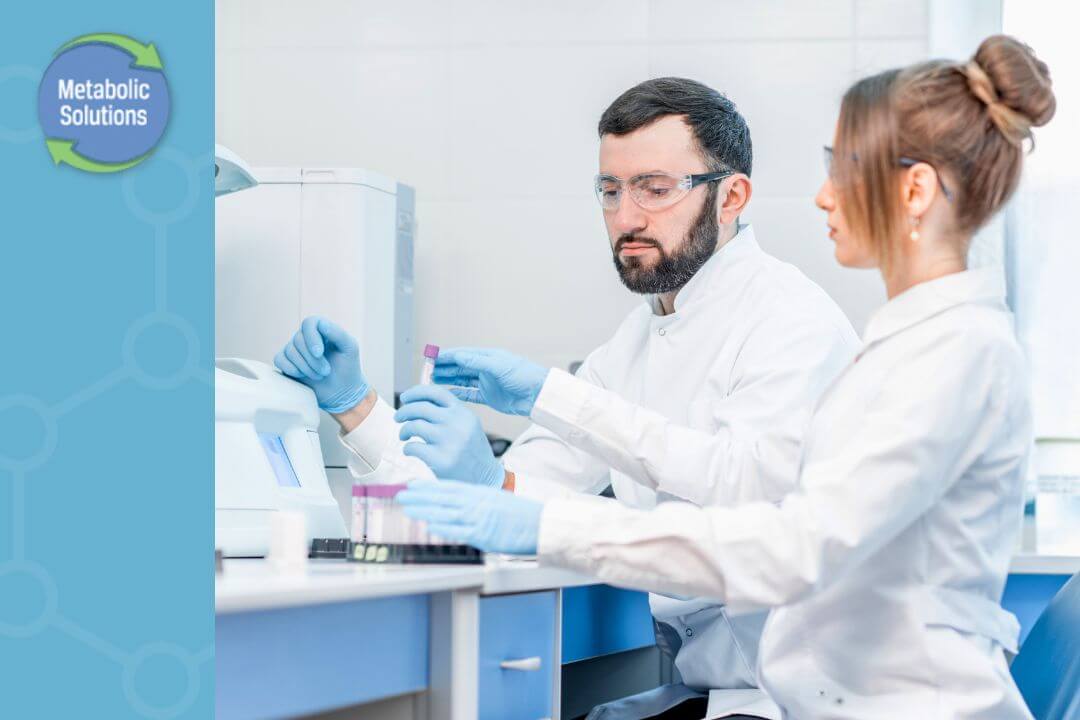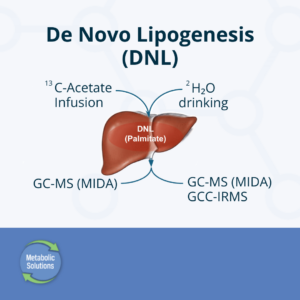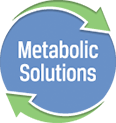
21 Feb Support Your Preclinical and Clinical Studies with De Novo Lipogenesis Assay
Understanding liver metabolic activity is a cornerstone of advancing research into conditions like obesity, non-alcoholic steatohepatitis (NASH), and other metabolic disorders. The liver’s role in synthesizing fatty acids through de novo lipogenesis (DNL) offers critical insights into metabolic health, disease progression, and therapeutic intervention.
However, traditional methods such as biopsies or blood tests often fail to provide the depth of data needed to track these processes dynamically or non-invasively.
Metabolic Solutions’ De Novo Lipogenesis (DNL) assay bridges this gap by leveraging cutting-edge stable isotope labeling and advanced mass spectrometry. This innovative approach provides researchers with precise kinetic data, capturing the dynamic metabolic changes within hepatocytes with unmatched sensitivity. The DNL assay is not only non-invasive but also adaptable to the needs of preclinical and clinical studies, making it an indispensable tool for assessing the impact of therapeutic interventions.
With a strong foundation in GLP/GCP-compliant methodologies and over 30 years of expertise in stable isotope research, Metabolic Solutions empowers pharmaceutical and academic researchers to generate regulatory-ready, high-impact data that drives scientific discovery and innovation.
Let’s take a quick look at the DNL plays in metabolic research.
De Novo Lipogenesis in Metabolic Research
De novo lipogenesis (DNL) is a fundamental metabolic process that plays a pivotal role in liver function and systemic metabolic health. While primarily regulated by the liver, DNL is intricately linked to broader metabolic pathways, making it an essential biomarker for understanding both health and disease.
De Novo Lipogenesis Defined
DNL is a biochemical pathway where the liver converts excess carbohydrates and other precursors into fatty acids, which are then stored as triglycerides or utilized in cellular processes. This pathway reflects the body’s ability to manage energy surplus and maintain metabolic equilibrium. Key precursors, including glucose and fructose, feed into this process, with fructose being particularly significant due to its role in modern diets and its high conversion efficiency into lipids.
Importantly, DNL is tightly regulated by hormonal signals and metabolic needs. Dysregulation of this process is often a signal of metabolic imbalance, making it a critical focus for researchers investigating metabolic disorders.
Why is DNL Important?
DNL serves as a vital biomarker for assessing liver and metabolic health, offering insights into several critical areas:
- Obesity and Metabolic Syndrome
Elevated DNL activity is a hallmark of obesity, where the excess synthesis of fatty acids contributes to fat accumulation in the liver and adipose tissue. This leads to insulin resistance and systemic metabolic dysfunction, exacerbating health challenges associated with obesity. - Non-Alcoholic Steatohepatitis (NASH) and Metabolic Associated Steatohepatitis (MASH)
Dysregulated DNL is closely linked to the progression of NASH/MASH. These conditions are characterized by fat buildup and inflammation in the liver, leading to fibrosis and other complications. Understanding DNL dynamics can help researchers identify early markers of disease progression and therapeutic targets. - Other Metabolic Disorders
Beyond obesity and liver disease, DNL activity reflects systemic metabolic health. For instance, its dysregulation is associated with type 2 diabetes, cardiovascular diseases, and conditions driven by lipid metabolism abnormalities. Tracking DNL provides a window into how these broader disorders evolve and respond to interventions.

Practical Applications of DNL Research
The ability to measure and analyze DNL activity has far-reaching implications in both preclinical and clinical settings. Researchers and trial designers leverage DNL as a pharmacodynamic biomarker to better understand metabolic processes and monitor and assess drug efficacy during trials.
- Preclinical Drug Discovery
- DNL measurements allow researchers to assess how experimental therapies affect metabolic pathways in the liver.
- Early-stage insights into drug efficacy and safety help refine candidate selection and dosing strategies.
- For example, drugs targeting hepatic lipid synthesis pathways can be evaluated by tracking changes in DNL rates.
- Clinical Trials
- In clinical research, DNL serves as a dynamic biomarker to monitor how treatments impact liver metabolism over time.
- Minimally-invasive testing methods, employing stable isotope labeling, enhance subject compliance while providing robust data for regulatory submissions.
- Trials targeting NASH, MASH, or other liver disorders often rely on DNL measurements to establish endpoints and demonstrate therapeutic efficacy.
DNL and the Future of Metabolic Research
Advancements in technology and applications, such as the pairing of stable isotope labeling and high-resolution mass spectrometry, have transformed the way researchers measure DNL.
Let’s look at how our DNL assay benefits preclinical and clinical studies, and then how it enables precise tracking of fatty acid synthesis with kinetic data.
Metabolic Solutions’ DNL Assay for Preclinical and Clinical Studies
The ability to measure de novo lipogenesis (DNL) with precision and accuracy provides researchers with transformative data to drive insights into liver and metabolic health. MetSol’s advanced DNL assay is uniquely positioned to meet the demands of both preclinical and clinical studies, offering robust data that supports drug development and regulatory compliance.
Preclinical Applications
In the preclinical phase, the DNL assay enables researchers to explore the foundational effects of new therapies on hepatic metabolism. This early-stage understanding is critical for refining drug candidates and predicting clinical outcomes.
- Evaluate the Impact of New Therapies on Hepatic Metabolism
Our DNL assay can be used to measure how investigational compounds influence fatty acid synthesis in the liver. It can provide a clear picture of metabolic changes, helping researchers identify potential therapeutic benefits or side effects at an early stage.
- Gain Insights into Metabolic Pathways During Drug Development
By quantifying in time the incorporation of stable isotopes into newly synthesized fatty acids, our assay reveals detailed kinetic data that helps researchers understand the mechanisms of action for novel compounds and guides optimization of dosing strategies.
Clinical Applications
As therapies progress into clinical trials, the DNL assay becomes an invaluable tool for monitoring metabolic activity in a safe, non-invasive, and highly compliant manner.
1. Track Dynamic Liver Activity in Metabolic Disease Trials
Our assay provides dynamic insights into how therapies affect hepatic metabolism, offering key endpoints for conditions like obesity, NASH, and metabolic syndrome. Data collection across multiple time points captures subtle metabolic shifts, delivering more comprehensive trial data.
2. Enhance Subject Compliance with Non-Invasive Methods
Traditional approaches, such as liver biopsies, can pose significant challenges for compliance and subject retention in trials. Our DNL assay relies on stable isotope labeling and periodic blood, saliva, or urine sampling, making it a low-burden alternative for participants.
3. Ensure GLP/GCP Compliance for Regulatory Readiness
Conducted in Metabolic Solutions’ GLP/GCP-compliant laboratories, our assay ensures data integrity and consistency for FDA, EMA, and other regulatory submissions. Researchers can confidently include DNL measurements in their clinical trials, knowing the data meets rigorous regulatory standards.
Integrated Support for Preclinical and Clinical Research
In addition to the above benefits, Metabolic Solutions goes beyond assay execution, offering end-to-end support for study design, data analysis, and assay validation. This comprehensive approach helps researchers integrate the DNL assay seamlessly into their workflows, from early-stage discovery to late-stage trials.
How Does Our De Novo Lipogenesis Assay Work?
Metabolic Solutions’ DNL assay represents the cutting edge of metabolic research, providing unparalleled precision and adaptability for preclinical and clinical studies. By combining innovative methodologies with advanced mass spectrometry, the assay delivers dynamic insights into liver metabolism and its role in systemic health.
Methodologies: State-of-the-Art Approaches
MetSol employs two highly specialized stable isotope protocols to quantify DNL activity with exceptional accuracy:
- 1-13C-acetate GC-MS Protocol
This methodology leverages the infusion of sodium 1-13C-acetate to label hepatic stores of 13C-acetyl-CoA.- Subjects undergo a continuous infusion of sodium 1-13C-acetate following a 10-hour fast.
- The labeled acetyl-CoA is incorporated into newly synthesized fatty acids, during DNL.
- Blood samples are collected hourly over a 10-hour period to monitor labeling dynamics.
- Analysis involves isolation of palmitate from plasma triglycerides, followed by derivatization and quantification through gas chromatography-mass spectrometry (GC-MS) and Mass Isotopomer Distribution Analysis (MIDA).
- 2H2O GC-MS & GC-P-IRMS Protocol
This protocol uses deuterium oxide (2H2O) to achieve hydrogen enrichment in DNL precursor pools.- Subjects consume four 60 mL doses of 2H2O over 5 hours, producing approximately 0.5% total body water enrichment.
- Deuterium is incorporated into 22 hydrogen positions of newly synthesized palmitate molecules.
- Plasma samples are collected to measure 2H2O enrichment and fatty acid labeling.
- Quantification is performed using GC-MS or gas chromatography coupled with pyrolysis-isotope ratio mass spectrometry (GC-P-IRMS), with subsequent MIDA analysis.
These complementary methodologies ensure flexibility for researchers while maintaining the highest standards of precision and data quality.
Why Preclinical and Clinical Trial Stage Companies Trust Metabolic Solutions’ DNL Assay
Our assay is designed to meet the demands of modern metabolic research with the following advantages:
- Non-Invasive, Dynamic Data Collection Unlike invasive liver biopsies, the DNL assay uses metabolic stable isotope labeling and sampling over time to provide comprehensive kinetic metabolic data. This approach improves subject compliance, particularly in clinical settings, without compromising data quality.
- High Sensitivity and Precision Advanced GC-MS and GC-P-IRMS technologies enable precise quantification of isotope incorporation, detecting subtle changes in DNL activity. We support sensitivity metrics as fine as 0.001% isotope enrichment, delivering unmatched reliability for kinetic biomarker tracking.
- Regulatory Readiness Our assay is processed by Metabolic Solutions’ GLP/GCP-compliant laboratories, ensuring that all data generated is suitable for FDA, EMA, and other regulatory submissions.
- Versatility Across Research Phases
From early drug discovery to clinical trials, our DNL assay is suitable to the needs of each study phase, supporting metabolic research with robust, actionable data.
Why Choose Metabolic Solutions for Your DNL Needs?
Metabolic Solutions is your trusted partner in advancing metabolic research, with a proven track record of delivering precise, reliable, and regulatory-ready data.
With over 30 years of expertise in stable isotope research and support from GLP/GCP-compliant facilities, our advanced De Novo Lipogenesis (DNL) assay offers unmatched sensitivity and non-invasive testing. Metabolic Solutions provides comprehensive support—from study design and assay validation to regulatory submissions—ensuring robust, high-quality data across both preclinical and clinical studies.
Partnering with Metabolic Solutions means gaining access to cutting-edge technology and deep scientific expertise, backed by a team dedicated to navigating the complexities of metabolic research and driving your success at every stage of your project.
Next Steps
Ready to unlock new insights into liver metabolism and elevate your research? Contact Metabolic Solutions today to learn how our DNL assay and specialized solutions can support your preclinical and clinical studies. Let us help you take the next step in advancing metabolic research with precision, compliance, and confidence.


